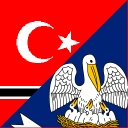Yogyakarta 39 Days of Exile
The tsunami on December 26th, 2004, was an unimaginable devastation for Indonesia. We met with people who usually used the figure of 200,000 dead, but essentially argued that the level was so horrendous and the destruction so immense that there was no real count and in fact some said that after a awhile the authorities simply stopped counting.
Now nine months later the three groups we visited with who were involved in Aceh ran the gamut from community through UPC to labor with ASPEK (one of the fastest growing unions in Indonesia) to Solidaritas Perempuan (SP/ Women’s Solidarity for Human Rights). None of the reports were encouraging. We also ran into a number of other people throughout our trip that had spent time there in one connection or another and most of their comments confirmed that the trouble was not over for the hard hit region and its people.
There may be some cautionary tales here for New Orleans and the Gulf Coast region in the wake of Katrina.
It is clear that there is an immense amount of money that has poured into the region. One would hear of a Save the Children Foundation with $150,000,000 USD to spend. A very sharp woman we met in Yogyakarta confirmed that Oxfam had a huge presence in the area. We had heard that Oxfam was renting an entire hotel in Aceh to house 80 of their international staff, which she confirmed.
It is also clear that from this calamity there has not come a political situation to decades of civil war pitting forces within the province and the federal authorities in the Republic of Indonesia. The RI has agreed to allow the province to operate with semi-autonomy, keeping a higher allotment of its natural resources, peace has come to the area, and it has genuinely opened to outside forces for the first time, so many of the Indonesia based organizations are jumping at the opportunity closed to them for so long.
But with some of these encouraging developments has also come a lack of coordination at all governmental levels — similar to what New Orleans has revealed — and this meant a decided lack of progress in many basic areas. People are largely in tents and temporary housing with very little exceptions.
The Urban Poor Consortium, which normally runs on about $200,000 USD per year, has a $10,000,000 USD per year project in Aceh working with nearly 30 fisherman communities. Much of the money centers on a commitment to produce 2500 units of housing. They have worked with people to build more than 800 houses thus far, which they find discouraging, but which seems to have made them more effective than most. Wardah Hafidz had virtually moved to Aceh to run the project. She was openly critical of NGO’s in the region as well as the constant struggle with governmental bureaucracies in order to get things done, particularly because there was little willingness to include local residents and their interests and voices in any of the process. The tug of war between families focused on the fishing industry and their economic needs to be close to water confronted with the regulations about how far new housing should be built away from the water. Reconciling positions where both sides have merit seems impossible. As community organizers, Wardah and her staff seemed to have finally presented the government with a fait accompli since folks built houses where they felt they had to do so, and the desperate need for housing produced at the least a stalemate.
Others seemed almost unable to figure out how to use the huge resources at their disposal — or at least in no hurry to do so. Resentments between national, Indonesian staff of these projects and the international, NGO paymasters seemed resolutely bad. In a session — organized by the American Embassy — some of us did with students and others at a local Yogyakarta university questions from the floor even raised grievances of disparate pay, benefits, and treatment of national versus international staff by NGO’s.
A lot of outfits seem very fast to raise the money, and very slow to spend it. The citizen involvement and control of projects seems non-existent. The outsiders seem to be calling the tune, not the locals, and they seem to like it that way. Government seems overwhelmed by the dimensions of the catastrophe. The money is a powerful magnet and the good will of many is undeniable, but good intentions do not seem to be producing much paving yet.
In the wake of New Orleans many implored me to visit. Wardah tried to get me to abandon the Forum and come immediately to Aceh after we met. It may be necessary, but one has a feeling that there will never be a happy ending in Aceh, and one worries that the same may be in store for New Orleans as well.
September 30, 2005
